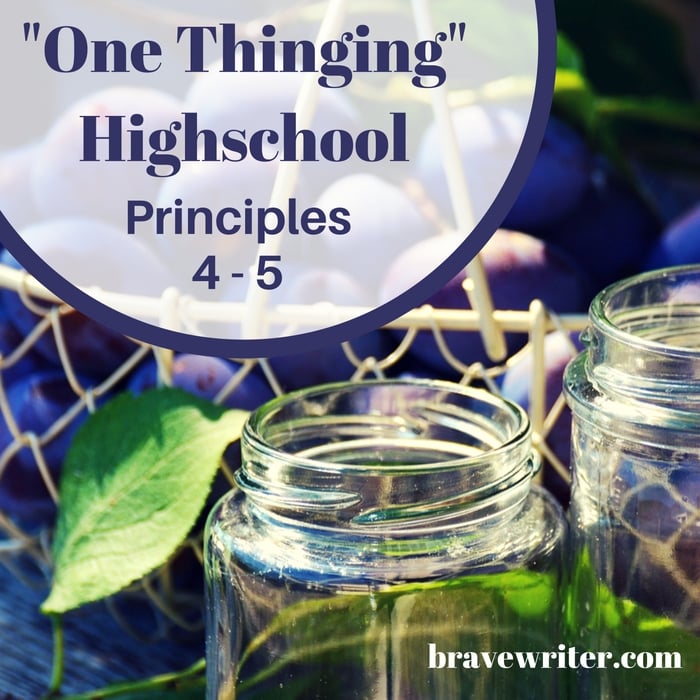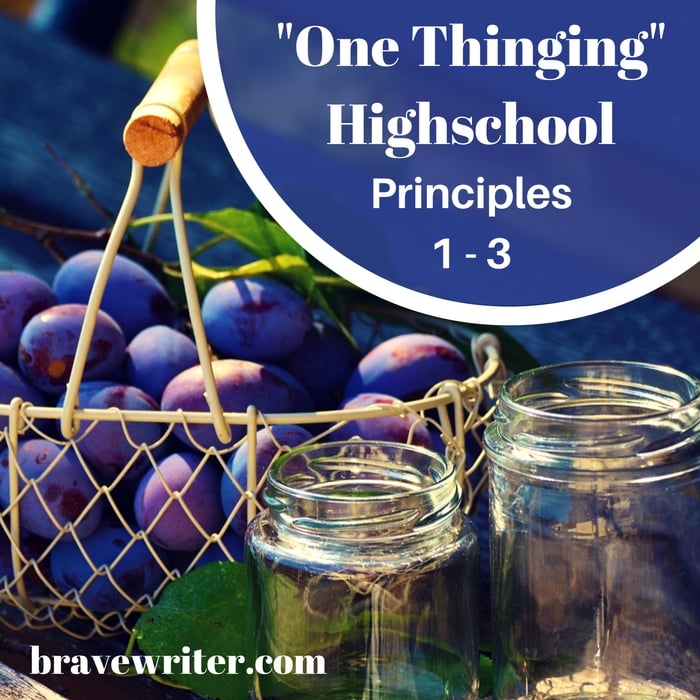I’ve elucidated some of the ideas that have been meaningful and useful to me in raising teens and working with them over the years. What I wanted to do now is to move into how these ideas connect to writing (and by extrapolation, perhaps, other subjects you are teaching).
I’ve suggested that teens need adventure, they aren’t lazy, but bored, they have interests that interest them, and that teens deserve a social life and live in a wired world.
These principles have to do with honoring your teens’ evolving sense of personhood. As we know from all the Brave Writer writing advice given over the years, the place we start in writing is with the writer, not with writing forms or skills. We begin by recognizing that the writer is someone whose mind is already brimming with experiences, ideas, thoughts, hopes, information, insight and humor that deserve to be recorded and shared with others. We yield to the process of nurturing writers, not requiring writing. We look for ways to validate that emerging writer’s voice. We celebrate successes, we minimize errors fully confident that over time, fluency will come through repeated excursions into written language, just like we saw spoken errors as passing phases on the journey toward fluency in speaking English.
With our teens, then, writing at this stage of development ought to be (if at all possible) the flowering of greater and greater self-awareness and ease in the act of writing. In other words, just like your 10-13 year old never thinks about speaking (does so easily, in his or her own voice, speaking what’s on his or her mind freely), so your high school writer ought to be more and more able to use written language to communicate ideas, thoughts, arguments and insights. Fluency (ease) comes earlier than competence (effective argument or communication), just like in speaking. Kids can talk easily even if they can’t yet enter a debate or give a speech or teach a class.
Teens need adventure, they need not to be bored, they need stimulation in areas that interest them. Use these principles to your advantage in writing. It’s easier to write an argumentative essay about animal rights when your teen volunteers at the local zoo or vet, than it is to write about the death penalty, a topic he’s never studied. Literary analysis goes better when the teen writes about an author that she loves. If Jane Austen is her favorite, why write about Hemingway? The same skills can be learned using the material she knows best.
Remember the value of direct experience in adding depth and insight to writing. Trips to foreign countries, service to others, working in a political campaign, a part-time job, serving on the library literature board for teens, varsity sports, musical performance… these experiences contribute to your teens’ growing expertise and competence level. Allow these to show themselves in their writing.
Likewise, don’t forget the value of peer relationships and technology in nurturing your writers. Writing and literature discussion groups create natural spaces for sharing writing. Classes (whether in person or over the Internet) offer opportunities to mix with peers as well as to compete with them while working on writing. Writing also benefits from teenagers’ hunger to master technology: skillful use of search engines, reading other writing online, facility with Word and PowerPoint, online courses and so on.
What it all boils down to really is this: see the world through your teens’ eyes. Don’t forget what it was like to be a teen. While they may do “dumb” things occasionally due to the underdeveloped frontal lobe, they also benefit immensely from deep engagement and investment into ideas, people and experiences that cause them to make connections between their world and the larger world around them. Writing is one tool that serves to integrate those disparate bits of information into a more thoughtful whole. When your teens take what they know (or think they know) and put it onto paper, they are required to slow down, examine their ideas and submit them for examination to others who can guide them in the process. Teens who feel the support and enthusiasm of their parents during this odyssey are the lucky ones.





















